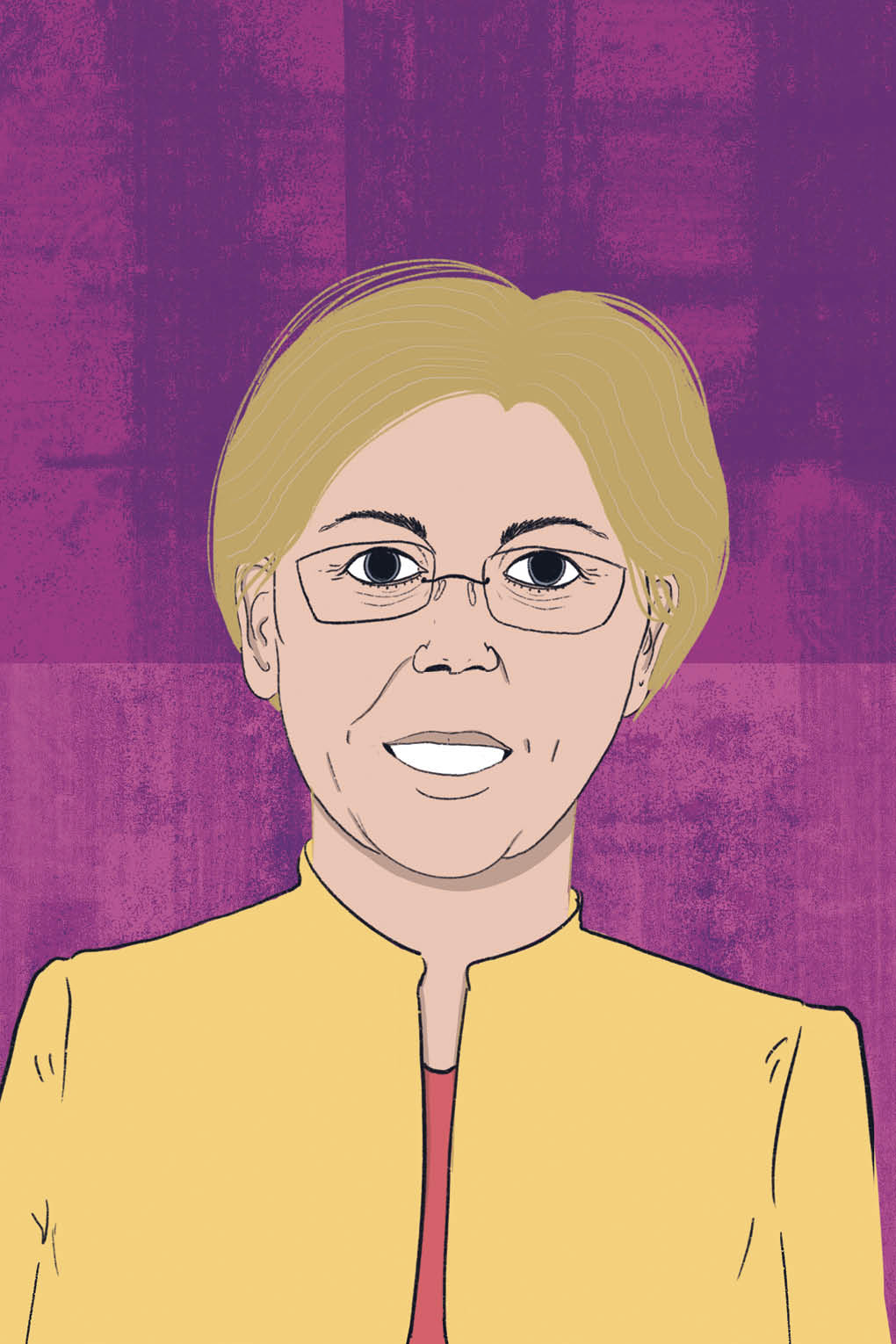Elizabeth Warren
née Elizabeth Ann Herring (born 1949)
“I don’t want happy face conclusions. I want the truth.”


Years in political office: 2013–present
Position: US senator from Massachusetts, 2013–present
Party affiliation: Democrat, 1996–present; Republican, before 1996
Hometown: Oklahoma City, Oklahoma
Top causes: childcare, home mortgage issues, bankruptcy issues, and parks and environment
Life Story
Oklahoma Dust Bowl survivors Pauline and Donald Jones Herring had three boys before their first girl, Elizabeth, was born. The future US senator’s dad was a salesman, but when Elizabeth was a teenager, he had a heart attack, and with the sudden onset of medical bills and pay cuts, the family had to hustle to adjust financially. They lost their car, and Warren’s mom took a minimum-wage job at Sears, on which they managed to scrape by. Given her personal history, perhaps it was no surprise that young Elizabeth would eventually become one of the United States’ leading experts on the financial disasters that low- and middle-class families often face.
But her rise to office was still a long way off. Warren grew up in a time when, in her words, “she could become a nurse or she could become a teacher.” After high school, Elizabeth earned a debate scholarship at George Washington University and, indeed, went off to be a teacher. She got married at nineteen, and at twenty-two had her first child—and eventual coauthor—Amelia.
Raising her first kid temporarily slowed down Warren’s career, but two years later, she got into Rutgers University and started classes on Amelia’s second birthday. It turned out, Warren loved law and respected its study as “an advanced degree in thinking.” She became a well-known law professor, teaching at many universities throughout the country.
At this point in her life, Warren was a pretty conservative thinker. That shifted when she dove deeper into her chosen specialty, bankruptcy law. She took part in a massive research project in the early ’80s for which she toured the country, talking to individuals who had filed for bankruptcy. She now admits that she went into the research looking to expose people who were gaming the system and costing taxpayers money. But she was surprised to discover that most of the people she spoke with were middle-class families who had hit rough times—they had gone through a death or a job loss and were often victims of predatory mortgage and credit card companies that profit off customers’ debt.
Warren began to realize that she’d have to step outside the ivory tower of academia to tackle these problems, but she was hesitant to become a politician. Until, that is, she was appointed to the National Bankruptcy Review Commission, a federal organization that investigated bankruptcies until it shut down in 1997. She went on to become a top financial adviser for the federal government, and President Barack Obama named her special adviser for an important new agency to protect US residents from predatory behavior by banks.
With her indisputable expertise, Warren proved essential in setting up the Consumer Financial Protection Bureau, a federal agency that makes sure financial companies treat people fairly, but she was denied a leadership position. Some said that Obama thought the banking industry would block her appointment because she was such a known adversary of the financial industry. Warren got so frustrated that she decided to run for the Senate, her first foray into electoral politics. At sixty-three years old, she won, besting an incumbent Republican to take over the Massachusetts US Senate seat—a position once held by President John F. Kennedy.
What’s on Her Agenda
Warren was immediately appointed to the Senate Banking Committee and established herself as a formidable opponent to CEOs who valued their financial bottom line over the lives of US families. She did not hesitate to speak out against the decisions of more powerful politicians—even Obama and Hillary Clinton (page 22) had to deal with her public critiques when they sided with the banking industry on key issues.
Warren’s profile has skyrocketed during her relatively brief political career, and she is considered one of the country’s most progressive senators. Convinced that her understanding of the average American’s financial realities belongs in the White House, she announced she would run for president in 2020. At first, in a move that some said would severely limit her campaign’s finances, she vowed not to accept money or assistance from PACs or Super PACs, but in February 2020 she reversed that decision. After the early 2020 primaries, she decided to end her campaign.
For all of her accomplishments, Warren is no stranger to controversy. She claimed to be of Cherokee and Dakota ancestry—which more than a few people found dubious. In response, she doubled down, publishing DNA test results of her faint (1/64th to 1/1,024th) Native American heritage. Actual Native leaders were offended, explaining to Warren that DNA tests have little to do with tribal affiliation. She offered a formal apology to the Cherokee Nation in 2019 before announcing her campaign for the White House, though many Native spokespeople still consider her out of touch with their concerns.
Warren inspired one of the best-known feminist rallying cries of the decade in 2017 when Trump nominated Jeff Sessions to be attorney general. While she read a rather scathing 1986 letter by civil rights activist Coretta Scott King protesting Sessions, Senate majority leader Mitch McConnell rebuked her. “She had appeared to violate the rule,” McConnell said. “She was warned. She was given an explanation. Nevertheless, she persisted.” McConnell could hardly have expected that scores of women would find strength in that last sentence, adopting it as a motto for perseverance in the face of challenge.
Awesome Achievements
- Warren is Massachusetts’s first woman senator.
- She has published eleven books, including two she coauthored with her daughter, Amelia Warren Tyagi, on issues facing the US middle class.
- During her career as a law professor, Warren taught at the Universities of Texas, Houston, Michigan, and Pennsylvania, in addition to Harvard University.
- Time magazine named her one of the hundred most influential people in the world—thrice.
Quotables
“The constant tension in a democracy is that those with money will try to capture the government to turn it to their own purposes.”
“The word’s out: I’m a woman, and I’m going to have trouble backing off on that.”
“Credit cards are like snakes: Handle ’em long enough, and one will bite you.”
“My first choice is a strong consumer agency. My second choice is no agency at all and plenty of blood and teeth left on the floor.”
“Millions of women have taken up ‘Nevertheless, She Persisted’ as their rallying cry because they know that together, we can make change. We know because we are doing it.”